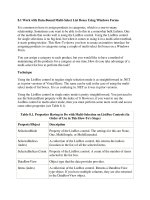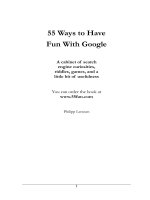55 Ways to Have Fun With Google ppt
Bạn đang xem bản rút gọn của tài liệu. Xem và tải ngay bản đầy đủ của tài liệu tại đây (7.88 MB, 228 trang )
1
55 Ways to Have
Fun With Google
A cabinet of search
engine curiosities,
riddles, games, and a
little bit of usefulness
You can order the book at
www.55fun.com
Philipp Lenssen
55 Ways to Have Fun With Google
2
55 Ways to Have fun With Google by Philipp Lenssen.
First edition 2006.
Released under a
Creative Commons Attribution-NonCommercial-ShareAlike 2.0 License
(see for more).
You are free:
• to copy, distribute, display, and perform the work
• to make derivative works
Under the following conditions:
By Attribution. You must attribute the work in the manner specified by the author or licensor.
Noncommercial. You may not use this work for commercial purposes.
Share Alike. If you alter, transform, or build upon this work, you may distribute the resulting
work only under a license identical to this one.
• For any reuse or distribution, you must make clear to others the license terms of this
work.
• Any of these conditions can be waived if you get permission from the copyright
holder.
Your fair use and other rights are in no way affected by the above.
3
On a spring day you can find your way
to a little flower garden where the Googleheads play
You know they’re there by the clothes they wear
And their Googlehead faces and their Googlehead hair.
‘Cause they’re the Googleheads
They shake their doodleheads
They’re the goo-ga-goo-ga-goo-gah Googleheads.
– Laurie Berkner
55 Ways to Have Fun With Google
4
Contents
Introduction 8
1. Egogoogling: Susan Is… 9
2. The Google Snake Game 15
3. Memecodes: Survival of the Fittest Web Pages 16
4. The Google Irritation Game, and the Google Image Quiz 19
5. Googling Proverbs 20
6. Browsing Images of a Site 24
7. A Brief History of Googlesport 25
8. What is Google, and what do people consider fun about it? 32
9. How Much Time Google Saves Us 37
10. Google Cookin’ a Lemon Chicken 40
11. Douglas Adams and the Google Calculator 41
12. Oops, I Googled Again 42
13. The Disappearing Google Logo, a Magic Trick 45
14. Fun With Google Maps, the Wiki Way 46
15. Dave Gorman’s Googlewhack 51
16. Google Q&A 54
17. Celebrate Google Non-Weddings, and More 56
18. Design Your SketchUp Dream House 58
19. Kevin Bacon and the Google Network 59
20. The Google Alphabet 62
5
21. Google Search Tips 63
22. Googlepark 66
23. Googleshare 76
24. The Shortest Google Search (and the One Returning the Most
Results) 79
25. Google Rotated and Mini Google 80
26. The Google Quiz: How Much Do You Know About Google? .82
27. Recreate Google From Memory 86
28. The Strange World of Google News 91
29. Aliens Attack Google! 100
30. Top Ten Signs You Are Addicted to Google 102
31. Dig a Hole Through Earth 103
32. Googlebombing 105
33. Google Ads Gone Wrong 109
34. Life in the Age of Google 114
35. Google Hacking 118
36. Googlepolls: Ask the Crowd 121
37. Googlefights 131
38. What If Google Was Evil? Plus: Five Inventions of the Google
Future 133
39. The Google Adventure Game 150
40. Egobot, Voice of the Web 151
41. Fun Google Gadgets 154
42. Forty-Two, or: A Science-Fiction Interlude 160
55 Ways to Have Fun With Google
6
43. The Google Book of World Records 175
44. Spelling Errors Galore 180
45. Google Groups, Time Machine 182
46. Growing a Google Word 188
47. Most Popular Words, and PopSents 190
48. Create Google Poetry, Prose, and Collages 195
49. Funny Google Videos 203
50. The Realplayer Fish, or: Telling a Story in Synonyms 207
51. Google Parodies 210
52. The Google Images Prediction Trick 217
53. Fun With Google Translations 218
54. The Giant Google Painting 219
55. Googledromes 224
Acknowledgments 225
Glossary 226
7
55 Ways to Have Fun With Google
8
Introduction
This book, in a way, is born out of my daily weblog “Google
Blogoscoped”
(blog.outer-court.com) and those who read it. Since 2003
I’ve been writing there covering all things Google – not just the fun
stuff, but news, discussion, interviews, tutorials, and everything beyond
with a relation to search engines. Thanks to those reading along and
providing pointers or feedback, I’ve been able to discover more
interesting pages and get to know more interesting people around the
world than ever before.
When I think of Google, first and foremost I think of its role to
discover knowledge, people, and people’s thoughts. Search engines are
truly one of the first emergents of a global brain, and in good tradition
of Gutenberg’s inventions in the technology of printing, of the
invention of the internet, and later the invention of the World Wide
Web. All those bring us closer together by speeding up the rhythm in
which we communicate.
So there we have it, for the first time in history: search, the key to
instant knowledge. And what do we do with it? Silly things. OK, not
exclusively. But silliness is a part of it. People googlewhack,
googlebomb, or egogoogle. People create parodies of Google. They
create search engine contests. Magic tricks, riddles and art based on
Google. They have a lot of fun with Google, and get together to play
games on top of Google services. Even Google Inc themselves send
out April Fool’s jokes every year, and celebration logos many times a
year. Oh, humanity!
But behind many of the playful creations surrounding that giant
Google toy, there are serious lessons to be learned. Of the 55 ways to
have fun with Google presented here, some ways indeed teach us
something; about life, Google, and how to become a better searcher.
And the rest of the ways? Well, seriously, they’re really just there to
have fun. And I hope you enjoy!
1. Egogoogling: Susan Is…
9
1. Egogoogling: Susan Is…
Have you ever searched for your own name on Google, curious what
the world has to say about you? Almost everyone of us did, one time
or another. In fact, you should – maybe others search for you all the
same, and you want to know what they will find.
The act of searching for yourself is also known as “egogoogling.”
Here’s a variant of it which can be a fun game. Enter your first name
followed by the word “is” into Google, and put the search in quotes.
For example, if your name is Susan, the search would look like this:
“susan is”
Now in the search result snippets, you will learn a lot of things about
you that you didn’t even know! For the name “Susan,” we get the
following:
Susan is an amazing person to work with!
Susan is an ethical woman and is refusing to cooperate
Susan is a very attractive young lady (with a boyfriend) who for
some reason is always late.
Susan is a top Florida residential real estate agent.
Susan is a top producer specializing in the ski resort town of
Breckenridge, as well as the surrounding area.
Not only can you apply this approach to find out more about yourself
(or just have a good laugh, actually, as the results are likely to be about
another person), you can also use this to find out about celebrities. To
do so, enter the full celebrity name followed by the word “is” into
Google, and put it in quotes again:
“arnold schwarzenegger is”
For action movie star Arnie, we get these results:
Arnold Schwarzenegger is a very talented man who would
make an excellent governor.
Arnold Schwarzenegger is falling into a similar spiral.
Arnold Schwarzenegger is looking out for voters’ best
interests.
55 Ways to Have Fun With Google
10
Arnold Schwarzenegger is a man more familiar with the red
carpets of a movie premiere than a white collar business seminar.
Arnold Schwarzenegger is terrifying as the “killer cyborg” who
“looks like Death rendered in steel.”
Arnold Schwarzenegger is The Terminator (T-800).
Arnold Schwarzenegger is quickly discovering that life in
politics doesn’t always produce the happy endings so common in
many of his Hollywood blockbusters.
Note that you can use “stars in,” “was born in” and similar glue words
instead of “is” to find out almost anything about a celebrity. You can
even expand the idea to include things, not people… try searching for
“Nikon cameras are” and similar queries.
If you don’t have Google near you, here are some popular male and
female names with their “egogoogled” results.
Male Names
Aaron is a monotonic anchor.
Adam is a deeply disturbing and depressing film.
Alan is AI’s pattern-matching chatbot.
Albert is so cute!
Andrew is the Patron Saint of Scotland.
Anthony is probably the best male vocal out there.
Arthur is kind of in a category by itself.
Brandon is for the birds.
Brian is embarrassed that he needs the extra help in school.
Carl is just sitting there in Nashville!
Charles is also a coach of AYSO youth soccer, an officer in the PTA of the
local elementary school.
Christopher is of mixed heritage (Asian-American).
Daniel is a natural talent .
David is not allowed computer access.
Dennis is one of Britain’s best known entrepreneurs.
Donald is rarely easy to understand, and people have supposedly heard him say
all sorts of risque things. Donald is a Professor in the Department of
Psychology.
Douglas is “King of California.”
Edward is a biological human (not a robot).
Edward is coming BACK to television.
Eric is featured on guitar and mandolin on the songs Viargra and Gypsy
woman.
Frank is hilariously funny on what makes us red-staters different from blue-
staters (not).
Fred is leading the Franklin Templeton Shootout after 2 rounds!
1. Egogoogling: Susan Is…
11
Gary is the editor and compiler of ResourceShelf.
George is, quite simply, the worst helpdesk technician ever.
Gerald is frightened and doesn’t understand why the woman wants to assist
him.
Gregory is recognized as one of the very foremost orators.
Harold is an original.
Henry is currently in jail.
Jack is looking for a house with about half an acre of land to buy in California.
James is as forthright as an Old Testament prophet.
Jason is who the JASON Project is named after.
Jeffrey is helping to clear up this cosmic murkiness.
Jeremy is a conscientious worker who can usually be relied upon.
Jerry is a master at understanding your goals for the photograph and then
creating the perfect lighting.
Joe is “LIVE” daily.
John is succeeding marvelously in journalism’s highest calling: to encourage
people .
Jonathan is writing a magical fable of his grandfather’s village in Ukraine.
Joseph is the Special Assistant to the President and Senior Director.
Joshua is home now.
Juan is similar to the one at the top of this page.
Justin is practicing walking on his hands.
Keith is a true character who comes across as being very sincere.
Kenneth is a strong advocate for community building and social change.
Kevin is creative director and co-founder at Lightroom.
Larry is also a political planner.
Lawrence is a New York Real Estate Broker specializing in Putnam.
Mark is coauthor of Inside Windows 2000, Third Edition (Microsoft Press).
Matthew is believed to have used Mark and the theoretical source.
Michael is abandoning the music business to release his songs online for free
instead.
Patrick is one of the nation’s best young auto racers.
Paul is backwards in line and taller than everyone else, again.
Peter is a consultant with a distinguished academic track record.
Ralph is not beyond fishing around for a philosophical explanation.
Raymond is an observer-participant anthropologist in the Internet
Richard is often accused of being overly concerned with himself.
Robert is an elder in the Presbyterian Church (USA)
Roger is approached by a gangling, spotty computer scientist.
Ronald is known in more than 100 countries wherever you find McDonald’s
restaurants.
Ryan is clearly good at her job.
Samuel is irresistible.
Scott is arguably the most well-known and influential unknown composer.
Shawn is now 26 years old, lives in San Diego, enjoys snowboarding, taking
trips to Lake.
Stephen is working with Marvel to produce a series of comic books.
Steve is a DJ in Boston.
55 Ways to Have Fun With Google
12
Steven is writing the same song over and over.
Terry is back with his new group, The Society for Truth and Justice.
Thomas is still searching
Timothy is an accomplished juggler.
Walter is now 79 years of age and in excellent health.
William is truly “fit for a king.”
Female Names
Alice is an AIML engine written in C++.
Amanda is most known for her role in FOX’s hit TV show “The OC.”
Amy is sniff sniff sad about our recent barking on her “Re-name RSS
contest.”
Angela is absolutely swamped this week!
Ann is only a writer – and NOT a private detective.
Anna is helping out with the hurricane relief effort.
Anne is a storyteller.
Barbara is to go to Paddle Sports of Santa Barbara.
Betty is distinctively heard singing alongside Michael.
Brenda is the mother of 14 children, 12 of whom are adopted.
Carolyn is currently training for the next WNBA season.
Catherine is a star.
Christina is also busy promoting the line of footwear “Skechers.”
Christine is red and white.
Cindy is in “love with the attention.”
Cynthia is still on the border.
Debbie is an International Magician.
Deborah is pleased to announce two brand-new paintings!
Debra is a nationally recognized expert on communication skills.
Denise is funny, bright and bubbly.
Diana is currently in London, England where she is working on the artwork.
Diane is steadfast in her mission of marketing and negotiating the terms of
the sale.
Donna is recording her 2nd CD, "Feels Like Home", which will be released in
2001.
Doris is such a great zine.
Dorothy is 5 Dinosaur years old, and is very wise for her age.
Edith is only meaningful.
Elizabeth is just south of the expanding Addo Elephant National Park.
Ellen is Africa’s first lady president.
Emily is nation’s young poet of the year.
Heather is the one with the muscles.
Helen is Coming To Town!.
Irene: Irene is a wedding and portrait photographer serving parts of New
England and New York State. Jane is one of Victorian literature’s rebellious
heroines.
1. Egogoogling: Susan Is…
13
Janet is fantastic.
Janice is right there on that edge.
Jennifer is a genius.
Jessica is a joy and a delight that brings happiness to all of us.
Josephine is Under Construction!
Judith is no mythical personage.
Judy is going to still have to answer to a higher authority.
Julie is no longer a loner; she, too, learns about being a part of a community.
Karen is an experienced tutor in both fiddle and step dance.
Katherine is one of two large towns you will come across on the route
between Darwin and Alice.
Kathleen is foremost a musician.
Kathy is married to Rick Hilton, who is the wealthy grandson.
Kimberly is married to Johnny.
Laura is not a psychologist nor a psychiatrist.
Linda is now going to move to the south of Sweden.
Lisa is furious with Debbie.
Louise is a first-class song, there is no doubting.
Margaret is not the enemy.
Marie is an accomplished author with an important story to tell.
Martha is “free.”
Melissa is very open about her past.
Michelle is as Michelle does.
Nancy is also an award-winning video producer.
Nicole is now working hard on a NEW collection of tunes.
Pamela is coming into her glory today.
Rachel is well on her way to achieving her goals.
Rebecca is never seen, and yet she is the main character.
Ruth is a member of the American Immigration Lawyers Association.
Sandra is the fourth woman to win it all, compared to only three men.
Sara is right. Yes, it is true.
Sarah is still in the studio working.
Sharon is expected to decide this weekend.
Sherry is a type of wine originally produced in and around the town of Jerez.
Stephanie is so afraid of germs, she can’t stop washing her hands.
Susan is creative, perceptive, intuitive, and timely.
Suzanne is not Sue.
Tina is no acronym.
Virginia is a five-day bike tour.
Wendy is now the only comic featured on the website.
55 Ways to Have Fun With Google
14
(Original cartoon by the US government.)
2. The Google Snake Game
15
2. The Google Snake Game
Here’s a party game which needs nothing but a working internet
connection (say, a notebook or cell phone), and Google.com’s web
search. The goal is to create the longest phrase that Google can find by
alternately adding one word to the end of the other player’s search
phrase. Say, the first person starts with “Feelings”. Now the second
person adds a word, “are”, so we get “Feelings are” (Note the use of
quotation marks in the search query.)
Now every time a word is added, the phrase is searched for in Google,
and the resulting page count is announced to the group. The one
person who creates a sentence with zero results in Google loses and has
to do something silly (or if you want to play with points, he loses a
point, and the last person who created a sentence with results in Google
will win a point). To prevent cheating, the one whose turn is next is not
allowed to look at any search result snippet.
Let’s take our sample, and see what we get:
Peter: “Feelings” (53,200,000 results in Google)
Mary: “Feelings are” (2,100,000 results)
Jake: “Feelings are nothing” (1,090 results)
Susan: “Feelings are nothing and” (19 results)
Peter: “Feelings are nothing and we” (0 results)
Susan gets 1 point, and Peter gets minus 1 points (or has to do
something silly).
If you create too obscure a sentence there won’t be any results and you
will lose, but if your sentence gets too many results, your opponent will
also be able to create a sentence with results. The basic strategy is to try
to create sentences so silly that there are only a few results, but not so
silly there are no results…
55 Ways to Have Fun With Google
16
3. Memecodes: Survival of the Fittest Web
Pages
Memecodes are web pages with randomly created texts which are born
and die over the course of time. How is that possible? By basing those
pages on the rules of evolution: the more often a page is found and
clicked on in Google – the more popular it is – the more offspring it
produces.
The title Memecodes is a word play on Richard Dawkins memes from his
book “The Selfish Gene”
1
. In it, he wrote:
Examples of memes are tunes, ideas, catch-phrases, clothes
fashions, ways of making pots or of building arches. Just as
genes propagate themselves in the gene pool by leaping
from body to body via sperms or eggs, so memes
propagate themselves in the meme pool by leaping from
brain to brain via a process which, in the broad sense, can
be called imitation.
I created this experiment in early 2004 to watch it grow, with some
interesting results. Here’s how it worked in detail. First, based upon a
dictionary of words, pages with random texts were created. To make
sure the texts looked rather natural, words like “the” or “and” as well
as punctuation were added. The resulting pages contained
Jabberwockyish
2
paragraphs such as this one:
Cognac? Is sloth is waist is declare of bramble flood in of
stoical. Footman Hesitancy a for attention flabby wanton
and calculate vtol cyclamate that paprika feign the aline
fourth qualifications of in. Thatch, Saccharin hansom
rationale in dine numbers.
This page – or set of “genes” – was unique in the whole set of pages
which made up the “ecosystem.” Now there was a possibility certain
sentences or fragments of sentences made sense. One sentence, for
example, contained the phrase “corpulent pigeons,” which someone
3. Memecodes: Survival of the Fittest Web Pages
17
did indeed search for in Google. As soon as that happened and the
searcher clicked on the Memecodes result, this particular page created
offspring – it “mated” with the searcher, if you will. The offspring of
any page was the same page slightly mutated by randomly replacing
some of its words. This way, maybe “corpulent pigeons” became
“corpulent pink pigeons” (surely that would have had the chance to be
an even more successful gene) or it could turn into “corpulent tower
pigeons” (and face certain death over time, because rarely do people
search for such a thing!).
How did pages die then? There was a page population limit of a little
over 2,000 pages. Whenever a new page was born, the oldest page
would be removed (the link from the front-page of the Memecodes
experiment pointing to this page would be removed). If a page didn’t
manage to create offspring until then, its genes were unsuccessful in
surviving and would therefore not be continued.
Other genes (random texts) would be more successful, though. And
some of the successful pages would become even more successful in
turn, possibly finding a natural search niche to settle into: they lured
more and more searchers to find them by creating more and more
“natural language.” One day, the pages might even turn into
Shakespeare, and it wouldn’t need infinite monkeys to pull it off! Or
rather, that was my hope. But evolution takes a lot of time to show
results, and after little more than a year, I stopped the experiment.
Until then, however, a lot of people found their way onto the site and
thus produced offspring. All in all, a walloping 10,022 pages were born
(about 2,500 of those seed pages created automatically in the
beginning), with some Memecodes in their 5
th
generation.
Some of the popular sentences were truly strange, like “feel the wrath
of salivating mushroom eating frog aliens with microwave ovens,” or
the more down-to-earth “seagull sandwich.” Other sentences were
circling around the word “torrent,” because “Torrents” had started to
become a popular way to download video and other files on the web.
The only clearly recognizable pattern in successful genes, however,
were exotic words and word combinations I can’t even print here for
reasons you might be able to guess: they were all about “adult” topics.
Then again, I guess that’s nature!
End Notes
1. Dawkins, R. (1976). The Selfish Gene. (www.55fun.com/3.1)
55 Ways to Have Fun With Google
18
2. Jabberwocky is the title of a nonsensical poem from Lewis Carroll’s
Through the Looking-Glass and What Alice Found There (1872). It starts off
with “Twas brillig, and the slithy toves/ Did gyre and gimble in the
wabe.”
(www.55fun.com/3.2)
4. The Google Irritation Game, and the Google Image Quiz
19
4. The Google Irritation Game, and the
Google Image Quiz
This is probably the weirdest game on Google you will find online.
“Bemmu’s Cure for Google Irritation”
(www.55fun.com/9.1) moves all
kinds of Google-related sentences through the screen. Like “I hate
Googleplex,” “Who needs Larry,” or “Google doesn’t frighten me.”
Now it’s your job to type these sentences into a small box below the
screen as fast as you can before they disappear. When you succeed, you
get as many points as the phrase contains letters. If you don’t succeed,
you lose one of your 10 lives.
If you are looking for a little more long-term fun, I suggest my
Google Image Quiz
(blog.outer-court.com/quiz/). In it, you will be
presented with 15 images for every round. Then it’s your job to find
the correct search words that were used to find these images in Google
Images. Sounds easy? Give it a try, I’ve heard it’s addicting, too!
55 Ways to Have Fun With Google
20
5. Googling Proverbs
In his book Was Wir Wissen
1
(“what we know”), German author
Benjamin von Stuckrad-Barre tried to find the everyday life contexts in
which proverbs are used – and he used Google to do so. For example,
he searched for “Those who live in glass houses should not throw
stones” and then listed who was being referred to on the resulting web
pages (like discussion boards, or news articles). Let’s follow the same
approach for English proverbs here!
Who shouldn’t throw stones in a glass house?
• The plywood industries of Malaysia and Indonesia
• People who say Michael is guilty
• Those who tell on people who don’t follow a site’s Terms of
Service
• Russia
• People who call Greeks liars
What conquers all?
• Love
• Labor and perseverance
• Courage
• Truth
• Humor
• Linux
What can’t a man live by alone?
• Bread
• Rice
• Incompetence
• Crimefighting
• Chocolate
5. Googling Proverbs
21
• Bagels
• Jaffa Cakes
What’s not everything?
• Money
• Winning the prize, or the tournament
• Wikipedia
• Salad
• Ecology
• Speed
• Base salary
• Technological superiority
What best things in life are free?
• Sun Java Studio Enterprise 8.0
• Computers
• The Chicago Cultural Center’s top-notch music programming
• Online Black Jack
• Business opportunities
• A smile
• Seattle
Who let the dogs out?
• 49ers
• Karl, Bob, and Paulie
• Rumsfeld
• FOX
• Karl Rove
• Nintendo
55 Ways to Have Fun With Google
22
What is the new black?
• Lurid pink
• Keylogging
• Green Teat
• Fluffy
• Gray, or fuchsia, or red
• Caucasian
• UNPOP
• Benjamin
• Simplicity
• BeOSmodule
• Scrolling
• Blacker
• Polygamy
• Apathy
• Pacifism
• Downshifting
What shouldn’t you throw out with the bathwater?
• Musicians
• The crown
• The pervert
• The BabyCenter.com
• The leak
• The monitor
• The culture
• The dressed up chihuahua
• The concept of rural
• The artistic effort
• The Furbies
• The appraisal
5. Googling Proverbs
23
• God
• SOAP
• Pearls
• The fluoride
End Notes
1. Stuckrad-Barre, B.v. (2005). Was Wir Wissen. (www.55fun.com/5)
55 Ways to Have Fun With Google
24
6. Browsing Images of a Site
If you want to see all images of a particular website, you can use the
“site:” operator on Google Images
(images.google.com) – you may know
this operator from Google’s web search. For example, enter site:cnn.com
into the Google Images search box to see all images shown on CNN’s
website. Click on an image in the result list and you’re taken to the
respective page containing the image.
This approach is fun if you want to visually explore a site, and you are
not interested in any particular content on that site. However, you can
still combine the site search with an additional keyword. A search for
site:cnn.com clinton would therefore show CNN’s images of President Bill
Clinton, or images related to him.
Want to try this out on a site a little more fun than CNN? I suggest
you enter the following for thousands of riveting photo illusions:
site:worth1000.com
7. A Brief History of Googlesport
25
7. A Brief History of Googlesport
It may be that all games are silly. But then, so are humans.
– Robert Lynd
People today often participate in a challenge called “Search Engine
Optimization contests.” In a nut-shell, the goal of these contests is to
get to be the top ranked page in the Google search results for a given
term or phrase. In order to not disturb “normal” search results,
contests often take nonsensical words as their target. While in the
beginning I was often taking part in these contests myself, after many
lessons learned (including a contest for the nonsense phrase “Seraphim
Proudleduck”) today I do not participate in them anymore. But before
we jump into the history of search engine optimization contests, let’s go
back several thousand years and start recapping the history of search
engines themselves.
B.C-1956: The Dawn of Computing
Before Christ, there was the counting aid Abacus. Some centuries later,
in 1642, Blaise Pascal builds a mechanical calculator. Around 1820,
Charles Babbage follows-up with his steam-powered Difference
Engine, and Countess of Lovelace Augusta Ada Byron is pondering
programming it after having met him.
The first computer (a programmable calculator) by German engineer
Konrad Zuse is completed in 1941.
Britain and USA take over the computing technology field with
Colossus, ENIAC, the transistor (by Bell Telephone), and UNIVAC –
the “Universal Automatic Computer.”
1957-1990: The Internet
In 1957, ARPA (the Advanced Research Projects Agency, within the
Department of Defense, DoD) is created to foster US technology.
Some ten years later, DARPA marks the beginnings of the Internet.
Intel is founded in ‘68, Doug Engelbart spends time show-casing his
revolutionary ideas of word processing, and a year later, Xerox creates
the equally revolutionary think tank PARC, the Palo Alto Research
Center. Universities are slowly being connected together via
ARPANET in 1969. In 1977, Apple II is born, followed by the IBM









